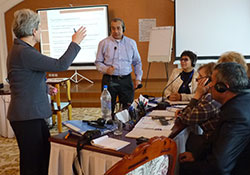WHO workshop to enhance biosafety and biosecurity in Tajikistan

WHO/Tahmina Alimamedova
Public health and clinical diagnostic laboratories support diagnosis and treatment of disease and provide early warning of disease outbreaks, not only at a national level but also in the context of the International Health Regulations. Ensuring that these laboratories operate according to international principles of quality and safety is crucial for improving health systems.
As part of a European Union and International Science and Technology Center (ISTC) initiative in central Asia, operating under the umbrella of the “Better Labs for Better Health” initiative recently launched by WHO/Europe and partners, WHO conducted a training workshop on biorisk management 28 January to 7 February 2013 in Dushanbe, Tajikistan.
Organized by WHO/Europe in collaboration with WHO headquarters, the training is based on a standardized risk-assessment approach and is part of an ongoing effort to establish a Regional Biosafety Training Centre in Dushanbe for capacity building of Tajikistan and Afghanistan laboratory professionals.
In an opening presentation, Dr Pavel Ursu, WHO Representative/Head of the WHO Country Office in Tajikistan, highlighted that biosafety and biosecurity are essential components of improvements to laboratory services. He also stressed the importance of disease prevention as a means to ensure effective improvement of public health.
Practical approach to strengthening laboratory services
The workshop followed the framework of the WHO Biorisk Management Advanced Trainer Programme and was facilitated by Dr Magdi Samaan (Biosafety and Laboratory Biosecurity Programme, WHO headquarters) and Dr Caroline Brown (Programme Manager, Influenza & Other Respiratory Pathogens at WHO/Europe).
Over 15 laboratory professionals from key national laboratories in Dushanbe participated in the training-of-trainers course, in which they learned state-of-the-art adult teaching skills through group sessions, practical exercises and video recordings. As a next step in establishing the Regional Biosafety Training Centre in Dushanbe, WHO is supporting development of the training curriculum in biosafety for national and regional laboratories in Tajikistan.



